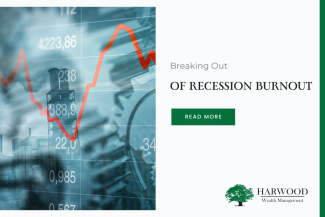
Breaking Out of Recession Burnout
Nearly 1 in 3 Americans report that they aren't prepared for a recession — despite the near-constant drumbeat of recession talk from media and economic experts alike.1 This lack of preparation may be the result of "recession fatigue" or the exhaustion and burnout that can come from years of recession predictions that have yet to pan out.
Below, we discuss more about the likelihood of a recession in the near future, as well as what you can do to prepare yourself for lean economic times regardless of whether a recession does occur.
Why has a recession been predicted for so long?
A recession is defined as six straight months of declining GDP (the value of all U.S.-produced goods and services).2 And since the pandemic, rising inflation, supply chain woes, and labor issues have combined to create a perfect storm of declining economic activity. However, despite these challenges, recession fears haven't yet come to pass.
Is a recession likely to happen soon?
Many experts continue to predict a recession for late 2023. However, consumer spending and employment figures remain strong and, unless there is some change in one or both of those factors, a recession may continue to loom just over the horizon without materializing.
What can you do to prepare for a recession?
The best time to prepare for a recession was yesterday — but the second best time is now. By getting your finances squared away before the economy declines, you'll be well-prepared to weather whatever uncertainty may come your way.
- Pay off high-interest debt. As the Federal Reserve continues to increase interest rates, this means the interest rate on your credit cards, home equity lines of credit, and other forms of credit will also increase. And rising interest rates mean that it will take more money to pay down the same amount of principal. You'll enjoy more purchasing power by eradicating any high-interest debts you hold before a recession strikes.
- Evaluate your expenses regularly. As the phrase implies, "lifestyle creep" can creep up on you quickly, and you may not even realize how much unnecessary spending is built into your budget. By reviewing your subscriptions, shopping around for insurance, and taking a fine-toothed comb to your monthly budget by tracking all your expenses for a month or two, you may be surprised at just how much money you can free up.
- Start (or supplement) your emergency fund. Do you have enough liquid cash to help you weather a brief job loss or major expense? If not, now may be the time to start saving. Having these funds on hand can provide you with reassurance if or when disaster strikes and help keep you from going into debt.
Although none of these tips can stop a recession in its tracks, they can put you in a much better position to thrive during uncertain economic times.
Footnotes
1 “Americans are suffering from financial burnout, report says,” CNBC, https://www.cnbc.com/2022/10/01/recession-fatigue-americans-are-suffering-from-financial-burnout.html
2 “Are we in a recession?” USA Today, https://www.usatoday.com/story/money/2023/06/09/are-we-in-recession/70304424007/
Important Disclosures
The opinions voiced in this material are for general information only and are not intended to provide specific advice or recommendations for any individual.
All information is believed to be from reliable sources; however, LPL Financial makes no representation as to its completeness or accuracy.
This article was prepared by WriterAccess.
LPL Tracking #1-05377014

